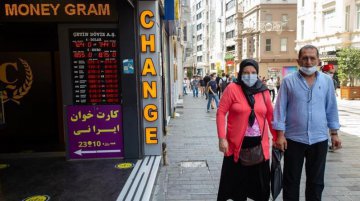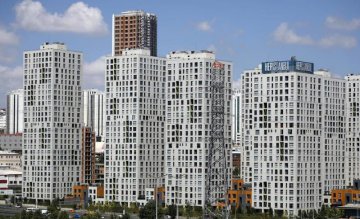ISTANBUL, Aug. 6 (Xinhua) -- Turkey needs to engage urgently in sustainable reforms to overcome vulnerabilities affecting its economy and made worse by the COVID-19 pandemic, experts said.
For the first time in over a decade, Turkey's economy is expected to shrink for the first time in 2020. The coronavirus's effects are expected to induce a 5-percent contraction, according to the International Monetary Fund (IMF).
The G20 country's foreign exchange reserves have been depleted in the past year to prop up the national currency, the lira, which has weakened again this week to record lows against the euro, and also the U.S. dollar.
The lira fell to its lowest level against the dollar on Thursday over general concerns regarding the economy. The Turkish currency fell to as low as 7.28 per dollar at midday, taking losses this year to nearly 20 percent.
The central bank used another 1 billion U.S. dollars in a single day on wednesday to prop up the embattled lira, without any notable result, depleting furthermore low foreign currency reserves, according to analysts.
The sliding lira constitutes a serious risk for the Ankara government and companies of repaying hard-currency debt contracted over the years, while Turkey's current account deficit is widening.
"Turkey has serious economic problems and those will not go away in a matter of days. The problem is that the country has no economic program since 2018, when a currency meltdown triggered the first recession in a decade," Yalcin Karatepe, a scholar from Ankara University told Xinhua.
This professor of economics argued that structural reforms are a must to ensure a more equitable distribution of wealth and revenues but that the Ankara government doesn't seem ready to realise these necessary steps.
"Unfortunately the government has preferred until now to take palliative measures rather than curative ones to address the vulnerabilities faced by the economy," he remarked.
On June 1, Turkey ended weekend lockdowns and eased other pandemic restrictions that had forced hundred thousands of businesses to suspend operations since mid-March, when the coronavirus started hitting the country.
This week's data showed Turkey's economic confidence index rebounded 11.8 percent month-on-month in July to 82.2 points, a third month of recovery from lows caused by coronavirus curbs.
Consumer price inflation rate fell to a lower-than-expected 11.76 percent year-on-year in July, official data showed Tuesday, reversing two months of rising inflation as the economy continues to emerge from a coronavirus lockdown.
Month-on-month, consumer prices rose 0.58 percent in July, the Turkish Statistical Institute (TurkStat) said.
"We will continue with determination our fight against inflation, resolution to reach the target and the structural steps we will take in this regard," Treasury and Finance minister Berat Albayrak said on Twitter, evaluating the data.
"Let's not forget that the real thing that is needed to reinvigorate consumer confidence is structural reforms," said H. Bader Aslan, a scholar from Istanbul's Arel University and columnist at economic daily Dunya.
He stressed that the government should implement structural reforms, especially after having faced like the rest of the world the impact of the COVID-19 pandemic that has caused a rise in unemployment.
The IMF also called on Ankara to carry out focused structural reforms to increase resilience to shocks, strengthen the border public sector balance sheet and improve transparency.
"These could include efforts to bolster the business climate," the found said in a report published on Tuesday, warning that the global financial stress could increase the risk of a debt default for Turkey.
Turkey's public and private foreign-denominated debt totals around 435 billion U.S. dollars, however professor Karatepe has ruled out such a worst-case scenario.
"I don't expect this to happen as companies have decreased their overall debt, but nevertheless with the lira weakening further, Turks' purchasing power will continue to drop and economic woes will inevitably linger," he added.





















Latest comments